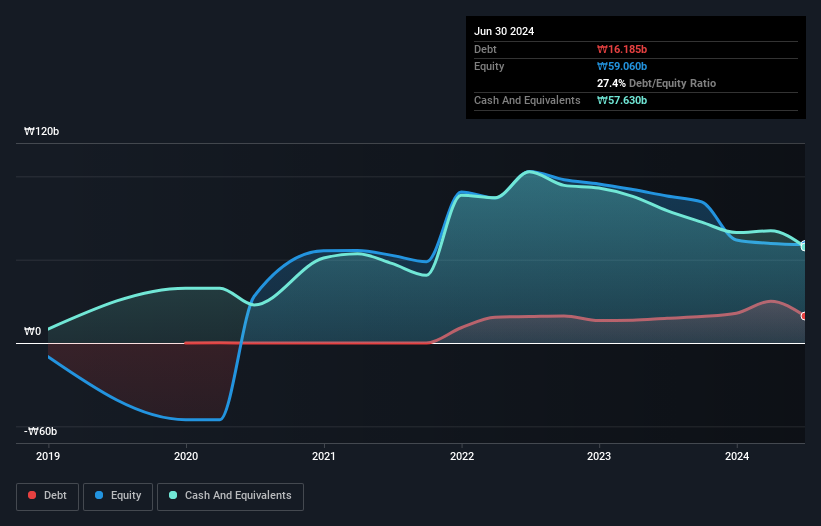The external fund manager backed by Berkshire Hathaway's Charlie Munger, Li Lu, makes no bones about it when he says 'The biggest investment risk is not the volatility of prices, but whether you will suffer a permanent loss of capital.' So it seems the smart money knows that debt - which is usually involved in bankruptcies - is a very important factor, when you assess how risky a company is. As with many other companies KoBioLabs, Inc (KOSDAQ:348150) makes use of debt. But is this debt a concern to shareholders?
What Risk Does Debt Bring?
Debt assists a business until the business has trouble paying it off, either with new capital or with free cash flow. Part and parcel of capitalism is the process of 'creative destruction' where failed businesses are mercilessly liquidated by their bankers. While that is not too common, we often do see indebted companies permanently diluting shareholders because lenders force them to raise capital at a distressed price. By replacing dilution, though, debt can be an extremely good tool for businesses that need capital to invest in growth at high rates of return. When we think about a company's use of debt, we first look at cash and debt together.
See our latest analysis for KoBioLabs
What Is KoBioLabs's Debt?
The image below, which you can click on for greater detail, shows that at June 2024 KoBioLabs had debt of ₩16.2b, up from ₩14.9b in one year. But it also has ₩57.6b in cash to offset that, meaning it has ₩41.4b net cash.

How Healthy Is KoBioLabs' Balance Sheet?
Zooming in on the latest balance sheet data, we can see that KoBioLabs had liabilities of ₩15.9b due within 12 months and liabilities of ₩31.4b due beyond that. Offsetting these obligations, it had cash of ₩57.6b as well as receivables valued at ₩6.06b due within 12 months. So it can boast ₩16.4b more liquid assets than total liabilities.
This short term liquidity is a sign that KoBioLabs could probably pay off its debt with ease, as its balance sheet is far from stretched. Succinctly put, KoBioLabs boasts net cash, so it's fair to say it does not have a heavy debt load! When analysing debt levels, the balance sheet is the obvious place to start. But you can't view debt in total isolation; since KoBioLabs will need earnings to service that debt. So when considering debt, it's definitely worth looking at the earnings trend. Click here for an interactive snapshot.
In the last year KoBioLabs wasn't profitable at an EBIT level, but managed to grow its revenue by 116%, to ₩52b. So its pretty obvious shareholders are hoping for more growth!
So How Risky Is KoBioLabs?
By their very nature companies that are losing money are more risky than those with a long history of profitability. And the fact is that over the last twelve months KoBioLabs lost money at the earnings before interest and tax (EBIT) line. Indeed, in that time it burnt through ₩19b of cash and made a loss of ₩11b. But the saving grace is the ₩41.4b on the balance sheet. That means it could keep spending at its current rate for more than two years. Importantly, KoBioLabs's revenue growth is hot to trot. While unprofitable companies can be risky, they can also grow hard and fast in those pre-profit years. There's no doubt that we learn most about debt from the balance sheet. However, not all investment risk resides within the balance sheet - far from it. For example, we've discovered 3 warning signs for KoBioLabs that you should be aware of before investing here.
If, after all that, you're more interested in a fast growing company with a rock-solid balance sheet, then check out our list of net cash growth stocks without delay.
Valuation is complex, but we're here to simplify it.
Discover if KoBioLabs might be undervalued or overvalued with our detailed analysis, featuring fair value estimates, potential risks, dividends, insider trades, and its financial condition.
Access Free AnalysisHave feedback on this article? Concerned about the content? Get in touch with us directly. Alternatively, email editorial-team (at) simplywallst.com.
This article by Simply Wall St is general in nature. We provide commentary based on historical data and analyst forecasts only using an unbiased methodology and our articles are not intended to be financial advice. It does not constitute a recommendation to buy or sell any stock, and does not take account of your objectives, or your financial situation. We aim to bring you long-term focused analysis driven by fundamental data. Note that our analysis may not factor in the latest price-sensitive company announcements or qualitative material. Simply Wall St has no position in any stocks mentioned.
About KOSDAQ:A348150
KoBioLabs
Provides microbiome therapeutics for metabolic, immune, and neurological diseases.
Excellent balance sheet and slightly overvalued.
Market Insights
Community Narratives



